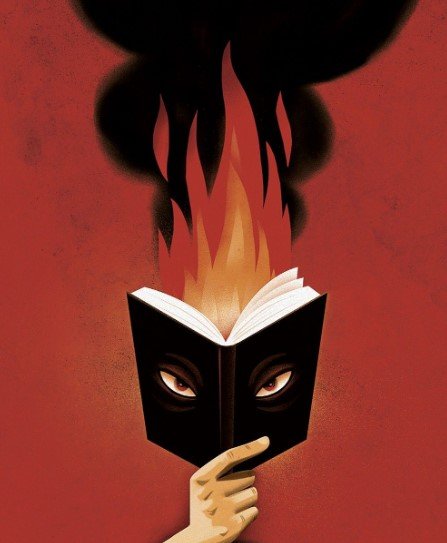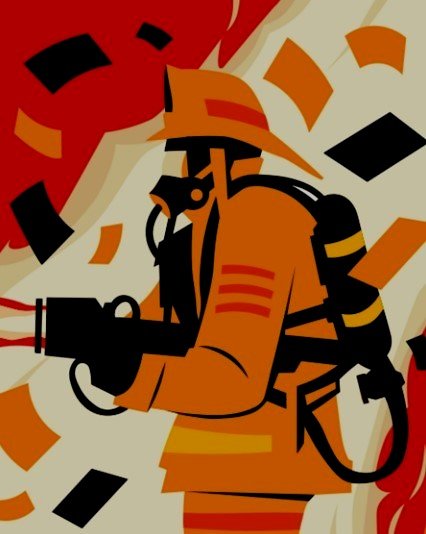Fahrenheit 451

Dystopian Fiction
“We need to be really bothered once in a while. How long is it since you were really bothered? About something important, about something real?”
What is a Dystopia?
Derived from the Greek dys (“ill” or “bad”) and topos (“place”), the word Dystopia literally means “Bad Place”.
A Dystopia is normally an imagined state or society in which great suffering or injustice occurs, typically one that is totalitarian by nature and in which information, independent thought, and freedom are restricted, censored, or ignored by the masses.
An Iconic Dystopian Fiction—Fahrenheit 451 Summary
In a futuristic American dystopian world, firemen start fires, they don’t put them out. In a society that is illiterate, unappreciative of nature, and where individuals are encouraged to be social recluses who have no independent thought or meaningful human interactions, pleasure and a flooding of senseless, curated information is the constant norm.
In short, books are burned, and uncensored media is illegal.
The story’s protagonist Guy Montag is opened to the emptiness his life and society have when encountering seventeen-year-old girl named Clarisse McClellan. Her innocently penetrating questions and unusual love of people and nature open Montag’s eyes to the possibility that there is something more and that his ignorance of truth may be more profound than he previously thought.
Montag’s spiral is only exacerbated when over the next few days, he experiences a series of traumatizing events. First, his wife attempts suicide by swallowing a bottle of sleeping pills. Second, in a response to an alarm that an old woman has a stash of hidden, illicit literature, this woman, rather than being taken into custody, shocks him by choosing to be burned alive with her books. Lastly, he hears that Clarisse, the girl that sparked it all, has been killed by a speeding car.
Montag’s curiosity of the nature of his book-burning profession and the dissatisfaction he his life increases as he begins to search for answers in a stash of books that he has stolen from his own fires.
When Montag fails to show up for work, Beatty, his fire chief and mentor, pays a visit to his house. In their conversation, Beatty explains the normality of fireman going through a phase of wondering what the books they burn really have to offer.
In a dizzying monologue, according to Beatty, the first books that came to be banned and later burned came from special-interest groups and other “minorities” who objected to the books due to their offensive nature. This fear of offending forced writers and thinkers to self-censor in their attempts to appease the feelings of the masses. But it wasn’t enough as society as a whole decided to simply burn books rather than permit any conflicting opinions.
Knowing of Montag’s illegal stash, Beatty tells his friend to take twenty-four hours to see if his stolen books contain anything worthwhile. After that, they need to be turned in for incineration. So, Montag begins reading.
Overwhelmed by the task at hand, Montag looks to his wife for help and support, but instead, she prefers television to her husband’s company. It is a terrible risk to read books after all. Remembering of an old, retired English professor named Faber, Montag decides that this man might be able to help him make sense of what he reads.
Faber states that the value of books lies in the detailed awareness of life that they contain—that Montag needs not only books, but also the leisure to read them and the freedom to act upon their ideas. In these conversations, Faber and Montag concoct a scheme to reshape the status quo. While Faber will contact a printer and begin reproducing books, Montag will plant books in the homes of firemen, discrediting the profession of censorship.
In order to coordinate their efforts, Faber gives Montag a two-way radio earpiece where they can hear and speak to each other in secret.
Montag goes home, where he sees his wife and two of her friends watching television, frivolously discussing family and war. Enraged by their superficiality, Montag takes out a book of poetry and reads “Dover Beach” by Matthew Arnold. Overhearing all of this, Faber buzzes in his ear for him to be quiet. Montag’s wife tries explaining the scene, stating that poetry reading is a standard way for firemen to demonstrate the uselessness of the literature they burn. Nevertheless, the two other women are disturbed by the reading and leave to file a complaint.
Leaving for the fire station, Montag hands over one of his books to Beatty. Impressed, Beatty presents a barrage of contradictory quotations from “great books”, exploiting these contradictions to show that literature is dangerously complex and therefore deserves incineration to protect civilization.
Suddenly, the alarm sounds for another book-burning. Rushing off to answer the call, Beatty and Montag discover the alarm is at Montag’s own home where they witness Montag’s wife Mildred getting into a cab with her suitcase.
Montag’s own wife has betrayed him.
Forcing Montag to burn his own home, Beatty moves to place him under arrest. Before this can take place, Montag turns the flamethrower on his superior, burning him to ashes. In a fight for his life, Montag knocks the other firemen unconscious and runs from the Mechanical Hound, a monstrous machine that Beatty has set to attack Montag. This machine pounces and injects Montag’s leg with a large dose of anesthetic before Montag manages to destroy it with his flamethrower. Escaping with his life and a handful of books hidden in his backyard, he hides these in another fireman’s house before calling in an alarm.
Arriving at Faber’s house, Montag learns that a new Hound has been tracking him, along with several helicopters and a television crew. Faber tells Montag that he is leaving for St. Louis to see a retired printer who may be able to help them in their cause. Before leaving, Faber tells him how to remove Montag’s scent from his house so the Hound will not enter. Montag then takes some of Faber’s old clothes and runs off toward the river as the whole city watches the chase unfold on TV. Managing to barely escape in the river and change into Faber’s clothes, Montag’s scent is disguised as he drifts downstream into the country where he eventually finds a group of renegade intellectuals (“the Book People”), who are a part of a nationwide network of book lovers that have memorized many great works of literature and philosophy.
A war has just been declared and it’s this fringe society that hopes to be of some help to mankind in the aftermath. Montag’s role in all this is to memorize the Book of Ecclesiastes. While enemy jets appear in the sky, completely obliterating the city with bombs, Montag and his new friends move on to search for survivors and rebuild civilization.
Bradbury feared Censorship and ignorance would ruin us
The days where the fiction stayed in the books is in the past:
“If you hide your ignorance, no one will hit you and you’ll never learn.”
What is Fahrenheit 451 about?
Life is full of hypocrisy and contradictions, and it is hubris that gives people the “moral obligation” to “protect others” from misinformation. It is these kinds of fact-checkers and disinformation boards that give themselves arbitrary authority, utilizing weapons of propaganda.
History is knowledge, and if knowledge is power, if one controls history, they have access to unfettered power—they can shape both culture and politics simultaneously.
Fear is the go-to tool of manipulation for propagandists and activist politicians. While Edward Bernays and modern marketers advocate for state-sponsored media and propaganda, Bradbury had a Huxleyan understanding that mindless consumption and desensitized interactions lead to mass control. If you distort the lines of history, you can shape public perception any direction you choose.
While the mediums and technologies have evolved, censorship is not a new idea or tactic. Book burnings is just one means of controlling the narrative. The power of controlling information is one any tyrant on the fringes of the Left or Right want access to. We should encourage differing ideas. Opposition allows for pure truth to be revealed.
Yes, humanity is full of hypocrisy, but that is truly the wonder in it. If we can find truth despite the fallacies within our own existence, that is a beautiful mess we should encourage.
In both fact and fiction, Utopias will always propagate Dystopias.
Kawika Miles is an American dystopian author who indulges in conversations of faith, family, and freedom. As a long time patriot, Kawika understands that only liberty minded individuals can save the future from the dystopian nightmare it is tumbling down, protecting the sanctity of life and individual independence. Read his debut novel Saga of the Nine: Origins today!












